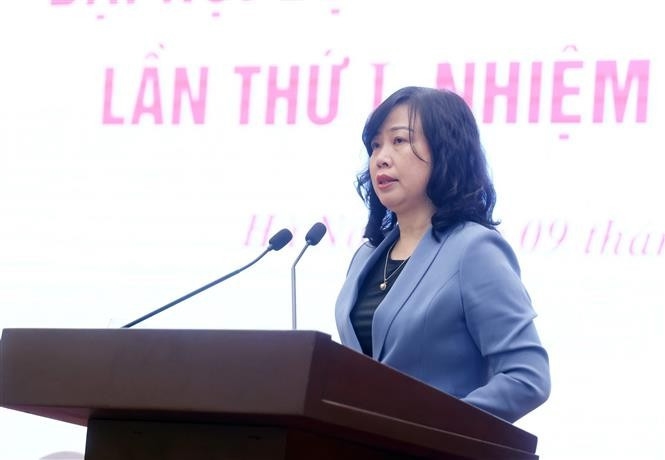Lan made the statement at a press conference in Hanoi on preparations for the first Congress of the Government’s Party Organization for the 2025–2030 tenure.
    |
 |
|
Minister of Health Dao Hong Lan speaks at a press conference in Hanoi on preparations for the first Congress of the Government’s Party Organization for the 2025-2030 tenure. |
Answering questions from reporters about the implementation of social security policies during this term, Lan said that social welfare policies are “people-centered,” serving both as a goal and a driving force for national development.
She stressed that both the 13th National Party Congress and lower-level Party congresses have consistently affirmed that social welfare is a key pillar linking economic growth with social equity. Despite challenges from the COVID-19 pandemic, natural disasters, and financial headwinds, social welfare policies have been implemented across four main pillars: social insurance, health insurance, unemployment insurance, and social assistance.
Over the past five years, the Government has issued several landmark resolutions to improve the quality of social welfare. These include Resolution No.42-NQ/TW on reforming and enhancing the effectiveness of social policies; Resolution No.71-NQ/TW on breakthroughs in education and training; and Resolution No.72-NQ/TW on strengthening public health protection and care.
Lan noted that social welfare programs have helped protect human rights, improve both material and spiritual well-being, and strengthen public trust. During the COVID-19 pandemic, the Government implemented four aid packages worth over 120 trillion VND (over 4.55 billion USD) and distributed 200,000 tons of rice, supporting millions of people and enterprises.
Vietnam’s insurance systems have expanded significantly, with more than 95 million people now covered by health insurance. The Government has also lowered the age for monthly allowances for the elderly from 80 to 75 years and expanded the number of beneficiaries.
The country’s social assistance network has grown from covering 2.7% of the population in 2016 to 4.5% in 2025, equivalent to 4.5 million people receiving regular support and 1.5 million receiving emergency aid annually.
Poverty reduction has recorded remarkable progress, with the national poverty rate dropping from 4.4% in 2021 to 1.93% in 2024, and is expected to fall to around 1% in 2025. The United Nations has recognized Vietnam as a bright spot in sustainable poverty reduction and implementation of social welfare policies.
A highlight of the recent term was the large-scale program to eradicate temporary and dilapidated houses, directly led by the Prime Minister. Mobilizing nearly 50 trillion VND from various sources, the program rebuilt or repaired over 334,000 homes, completing its target more than five years ahead of schedule.
This is just the beginning, Lan emphasized, adding that the effort to ensure secure housing and stable livelihoods must continue regularly, especially amid growing challenges from natural disasters and climate change.
She concluded that in the next phase, social welfare policies will continue to be expanded, better tailored to real needs, and implemented more effectively to ensure inclusive development and a better life for all.
Source: VNA